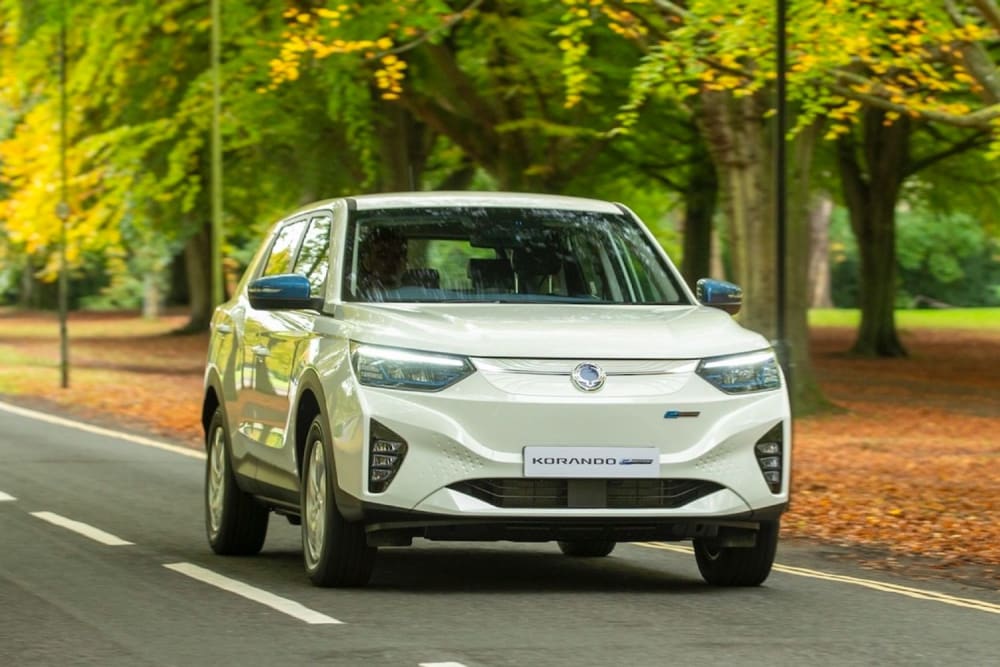Information and electric vehicles of the [object Object] brand

![[object Object] logo](https://res.cloudinary.com/donyiousk/image/upload/w_80/f_auto/c_scale,w_1400/v1/car/l7ewwcyl372uwnpdvqhq)
Ssangyong
Breathe easy, drive electric.



SsangYong electric vehicles
What makes SsangYong EVs different from other brands?+
While SsangYong is a relatively smaller player in the EV market compared to established brands, they do offer some unique features and considerations that set them apart:
Affordability: SsangYong EVs are generally known for being competitively priced compared to mainstream brands. The Korando e-Motion, for example, boasts a lower starting price than many similar-sized SUVs from bigger manufacturers. This can be a significant draw for budget-conscious buyers.
Warranty: SsangYong offers a generous 7-year or 150,000km warranty on their EVs, which is longer than the standard warranty coverage from most brands. This provides peace of mind for buyers in terms of long-term ownership and potential repair costs.
Focus on practicality: SsangYong has traditionally been known for building spacious and practical SUVs. This translates well to their EVs, with the Korando e-Motion offering ample cargo space and comfortable seating for five passengers. This practicality might appeal to families or those who require space for cargo or outdoor activities.
Unique character: SsangYong vehicles have a distinct design language that some find more adventurous or appealing than mainstream options. While not for everyone, this individuality can be a draw for buyers who want a car that stands out from the crowd.
Limited options: It's important to note that SsangYong currently offers only one fully electric model, the Korando e-Motion. This is in contrast to many other brands that have a wider range of EV options across different segments. So, your choice will be slightly limited.
Brand perception: SsangYong is still a relatively young brand in the EV market, and its overall brand recognition might not be as high as some established players. This could potentially affect resale value in the future compared to more established brands.
Ultimately, whether a SsangYong EV is right for you depends on your individual priorities and needs. Carefully compare the features, price, and warranty against your requirements and consider the limited model options before making a decision.
Here are some additional resources that might be helpful:
- SsangYong EV website: Link
- EV Database Korando e-Motion page: Link
- YouTube video comparing SsangYong Korando E-motion with Chinese rivals: Link
What are the different models of SsangYong EVs available?+
Currently, SsangYong has only one electric vehicle model available, the Korando e-Motion. It's a compact SUV that was launched in 2021 and offers a driving range of up to 339 km 210 miles on a single charge.
Here are some of its key specifications:
- Battery capacity: 61.5 kWh
- Electric motor: 195 hp 145 kW
- 0-100 km/h acceleration: 7.9 seconds
- Top speed: 165 km/h 102 mph
- AC charging: 6.6 kW 0-100% in 10 hours
- DC fast charging: 74 kW 20-80% in 36 minutes
SsangYong is also working on a new electric SUV called the E100, which is expected to be launched in 2024. The E100 will be a larger and more premium SUV than the Korando e-Motion, with a longer driving range and more powerful electric motor.
How much do SsangYong EVs cost?+
SsangYong currently offers two electric vehicles, and their prices vary depending on the model and location:
1. SsangYong Korando e-Motion:
- Starting price:
- Australia: $59,990 AUD plus on-road costs
- New Zealand: $59,990 NZD plus on-road costs
- United Kingdom: £31,995 GBP On The Road Price
- Range:
- Up to 250 miles 400 kilometers) (WLTP
- Up to 180 miles 290 kilometers) (real-world
- Features: 188 horsepower, 221 lb-ft torque, 62kWh battery, front-wheel drive, five-star Euro NCAP safety rating
2. SsangYong Torres EVX: recently launched in South Korea
- Starting price:
- ₩50 million $AU57,000 for the E5 variant
- ₩52 million $AU59,000 for the E7 variant
- Range:
- Up to 500km 311 miles) (WLTP
- Features: 218 horsepower, 380 lb-ft torque, 100kWh battery, all-wheel drive, advanced driver-assistance systems
Factors affecting price:
- Model: As you can see, the Torres EVX starts at a higher price point than the Korando e-Motion due to its larger size, longer range, and additional features.
- Location: Prices can vary significantly depending on the country and local taxes/incentives.
- Trim level: Some models may have different trim levels with varying features and prices.
Additional notes:
- SsangYong is currently undergoing restructuring, so future availability and pricing of their EVs may be subject to change.
- Be sure to check with your local SsangYong dealer for the most accurate and up-to-date pricing information.
What is the range of SsangYong EVs?+
SsangYong currently only has one fully electric vehicle in production, the Korando e-Motion.
The official WLTP range for the Korando e-Motion varies depending on how you measure it:
- WLTP combined range: 339 km 210 miles
- City WLTP range: 435 km 270 miles
- Highway WLTP range: 205 km 127 miles
However, it's important to note that these are official estimates under controlled test conditions. Real-world range will vary depending on several factors, including:
- Driving style: More aggressive driving will use more energy and reduce range.
- Weather: Cold weather reduces battery efficiency, while warm weather can improve it.
- Terrain: Hilly terrain demands more energy from the battery.
- Climate control system: Using the air conditioning or heating will reduce range.
- Additional load: Carrying extra weight, such as passengers or cargo, will also reduce range.
Therefore, you can expect the actual range of your Korando e-Motion to be somewhere between 205 km and 435 km, depending on the factors mentioned above.
Here are some resources for information on real-world Korando e-Motion range:
- EV Database: Link
- All new 2024 SsangYong Korando e-Motion RANGE TEST!: Link
How long does it take to charge a SsangYong EV?+
The charging time for a SsangYong EV depends on several factors, including:
- Model: Different SsangYong EVs have different battery capacities and charging capabilities. For example, the Korando E-Motion has a 71.7 kWh battery, while the Musso EV has a 64.8 kWh battery.
- Charger type: Charging speeds vary greatly depending on the type of charger used. A standard home outlet 2.3 kW) will be much slower than a rapid charger (74 kW.
- Battery level: Charging from 0% to 100% will take longer than charging from 20% to 80%.
- Ambient temperature: Extreme temperatures can affect charging speed.
Here are some examples of charging times for the SsangYong Korando E-Motion:
- Domestic socket 2.3 kW:
- 20 miles average daily mileage: 2 hours 3 minutes
- 20% to 80%: 16 hours 3 minutes
- 0% to 100%: 26 hours 44 minutes
- Rapid charger 74 kW:
- 0% to 80%: 30 minutes
So, to give you a more accurate answer, I would need to know more about the specific SsangYong EV model you're interested in, the type of charger you're planning to use, and the starting and ending battery levels.
I can also provide you with resources to find charging times for specific SsangYong EV models. For example, the SsangYong website has a charging calculator for the Korando E-Motion: Link
What are the maintenance requirements for a SsangYong EV?+
The maintenance requirements for a SsangYong EV will vary depending on the specific model you have, but here's a general overview:
Regular Maintenance:
- Oil Changes: While electric vehicles don't have engine oil in the traditional sense, they do have gear oil in the gearbox and differential that needs to be changed at regular intervals, typically every 12,000 to 15,000 kilometers.
- Tire Rotations and Wheel Alignments: Just like any other car, your SsangYong EV's tires will need to be rotated and the wheels aligned periodically to ensure even wear and tear. This is typically done every 5,000 to 10,000 kilometers.
- Brake Fluid Changes: Although EVs use regenerative braking to slow down, they still have traditional brakes that use brake fluid. This fluid needs to be changed periodically, typically every 2 years or 40,000 kilometers.
- Cabin Air Filter Replacement: The cabin air filter helps keep the air inside your car clean. It should be replaced every 12 months or 15,000 kilometers.
Electric Vehicle Specific Maintenance:
- Battery Health Check: The battery is the most important component of an EV, and it's important to have it checked regularly for any signs of degradation. This is typically done at the dealership during scheduled service intervals.
- Charging System Check: The charging system should also be checked periodically to ensure it's working properly. This includes the onboard charger, the charging cable, and the charging port.
- Software Updates: Just like any computer, your SsangYong EV's software may need to be updated periodically. These updates can fix bugs, improve performance, and add new features. They can be installed over-the-air or at the dealership.
Additional Tips:
- Consult your owner's manual for the specific maintenance schedule for your SsangYong EV model.
- Take your car to a qualified mechanic or dealership for service.
- Use high-quality parts and fluids when servicing your EV.
- Keep your EV clean and free of debris to help prevent corrosion.
By following these tips, you can help ensure that your SsangYong EV runs smoothly and efficiently for many years to come.
Does SsangYong offer any tax credits or incentives for purchasing an EV?+
Unfortunately, as of December 29, 2023, SsangYong does not offer any specific tax credits or incentives for purchasing an electric vehicle EV in Vietnam. This is because the Vietnamese government currently doesn't have any nationwide EV incentive programs in place.
However, there are some ongoing discussions and proposals for introducing EV incentives in Vietnam in the near future. These could potentially include tax breaks, registration fee reductions, or even direct subsidies for EV purchases. It's worth keeping an eye on developments in this area, as any new incentives could make SsangYong EVs more attractive in Vietnam.
In the meantime, you might consider looking into any potential incentives offered by the city of Ho Chi Minh City itself. Some cities in Vietnam have started implementing their own EV incentive programs, so it's possible that Ho Chi Minh City might have something in place. You can check with the city government or local dealerships for more information.
Additionally, depending on the specific SsangYong EV model you're interested in, there might be some general benefits associated with owning an EV in Vietnam, such as:
- Lower fuel costs: EVs obviously don't require gasoline, which can lead to significant cost savings over time, especially with current fuel prices.
- Reduced emissions: EVs produce zero tailpipe emissions, which can benefit the environment and potentially qualify you for certain environmental benefits in the future.
- Lower maintenance costs: EVs generally have fewer moving parts than gasoline cars, which can translate to lower maintenance costs in the long run.
While there aren't any specific SsangYong EV tax credits or incentives available in Vietnam right now, it's still worth considering the potential benefits of owning an EV. Hopefully, the Vietnamese government will introduce some nationwide EV incentives soon, which could make SsangYong EVs even more appealing to Vietnamese consumers.
What is the warranty on a SsangYong EV?+
The warranty on a SsangYong EV is exceptionally generous, offering two different coverage options depending on the region and year of purchase:
7-Year Unlimited Mileage Warranty:
- This warranty applies to new and demonstrator SsangYong EVs delivered from September 1st, 2018.
- It offers comprehensive coverage for all vehicle components, including the battery and electric motor, for a period of 7 years with no mileage limitations.
- This warranty provides peace of mind for owners, regardless of how much they drive their EV.
7-Year / 90,000 Miles Warranty:
- This warranty applies to SsangYong EVs purchased before September 1st, 2018 or in regions where the unlimited mileage option is not offered.
- It provides comprehensive coverage for all vehicle components, including the battery and electric motor, for a period of 7 years or up to 90,000 miles, whichever comes first.
- This warranty still offers excellent protection for most drivers, though those covering high mileage may prefer the unlimited option.
It's important to note that there may be certain exclusions and limitations- to these warranties, so it's always best to refer to the official warranty booklet that comes with your vehicle for all the details.
Here are some additional resources to help you find out more about the SsangYong EV warranty:
- SsangYong UK website: Link
- SsangYong Australia website: Link
- SsangYong USA website: Link
Where can I learn more about SsangYong EVs?+
There are a few places where you can learn more about SsangYong EVs:
- The SsangYong website: The official SsangYong website has a section dedicated to electric vehicles, where you can find information about the Korando e-Motion, the only SsangYong EV currently available. You can also find information about the brand's future plans for electric vehicles.
- Car review websites: There are a number of car review websites that have published reviews of the Korando e-Motion. These reviews can give you a good overview of the car's strengths and weaknesses, as well as how it compares to other electric SUVs on the market.
- YouTube: There are a number of YouTube videos that review the Korando e-Motion. These videos can give you a good sense of what the car is like to drive and how it looks in real life.
- EV forums: There are a number of online forums dedicated to electric vehicles. These forums can be a great resource for getting information and advice from other EV owners.
Here are some additional things to keep in mind when researching SsangYong EVs:
- SsangYong is a relatively small automaker, so its EVs may not be as widely available as those from larger brands.
- SsangYong is known for its affordable SUVs, and its EVs are no exception. The Korando e-Motion is one of the most affordable electric SUVs on the market.
- SsangYong EVs are not yet available in all markets. For example, they are not currently available in the United States.





































